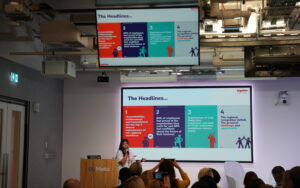Organisational culture is much more than a list of values displayed on a website or in a glossy brochure. Company culture is the shared values, attitudes, behaviours, and beliefs that shape how things work day-to-day. While values set the aspirations of an organisation’s culture, it’s the daily actions and interactions of employees that bring culture to life.
A company’s culture touches every aspect of its operations, from how decisions are made to how employees collaborate and communicate. However, it can be difficult to measure, which is why together developed its proprietary PREP model. This model looks at culture through the lens of Performance, Reputation, Engagement, and Purpose. It helps businesses understand how culture impacts not only performance and brand reputation but also employee engagement and the company’s alignment with its core mission.
In the Middle East, where businesses are often growing at a rapid pace, defining and nurturing culture is crucial for organisations that want to build a strong foundation for long-term success. With a diverse workforce that includes people from different backgrounds and cultures, companies need to be intentional about fostering a culture that resonates with everyone, ensuring that every employee feels valued and engaged.
At together, we’ve seen how a clear, well-defined culture can guide organisations through growth and change. Without this foundation, companies may struggle to align their operations with their mission, leading to inefficiencies and missed opportunities. Culture is not a one-size-fits-all concept—it needs to be shaped to fit the unique needs and values of each organisation.
Top Tips for Defining Organisational Culture:
- Identify core values – Start by identifying and defining the core values that should guide your company’s culture.
- Make culture tangible – Ensure that your company’s culture is reflected in everyday actions, decisions, and behaviours.
- Communicate clearly and consistently – Promote your culture through internal communications and ensure that it’s consistently reinforced by leadership.
- Engage employees – Involve employees in the process of shaping and evolving the culture, making them active participants.
- Measure and adapt – Regularly measure the effectiveness of your culture using feedback from employees, such as a culture survey, and adjust accordingly to meet evolving needs.
So, next time you visit a company’s website and see a set of values listed, remember that organisational culture is about much more than just words on a page. It’s about the lived experience of those values in everyday interactions, decisions, and behaviours across the organisation. What will you do to bring your values to life?




